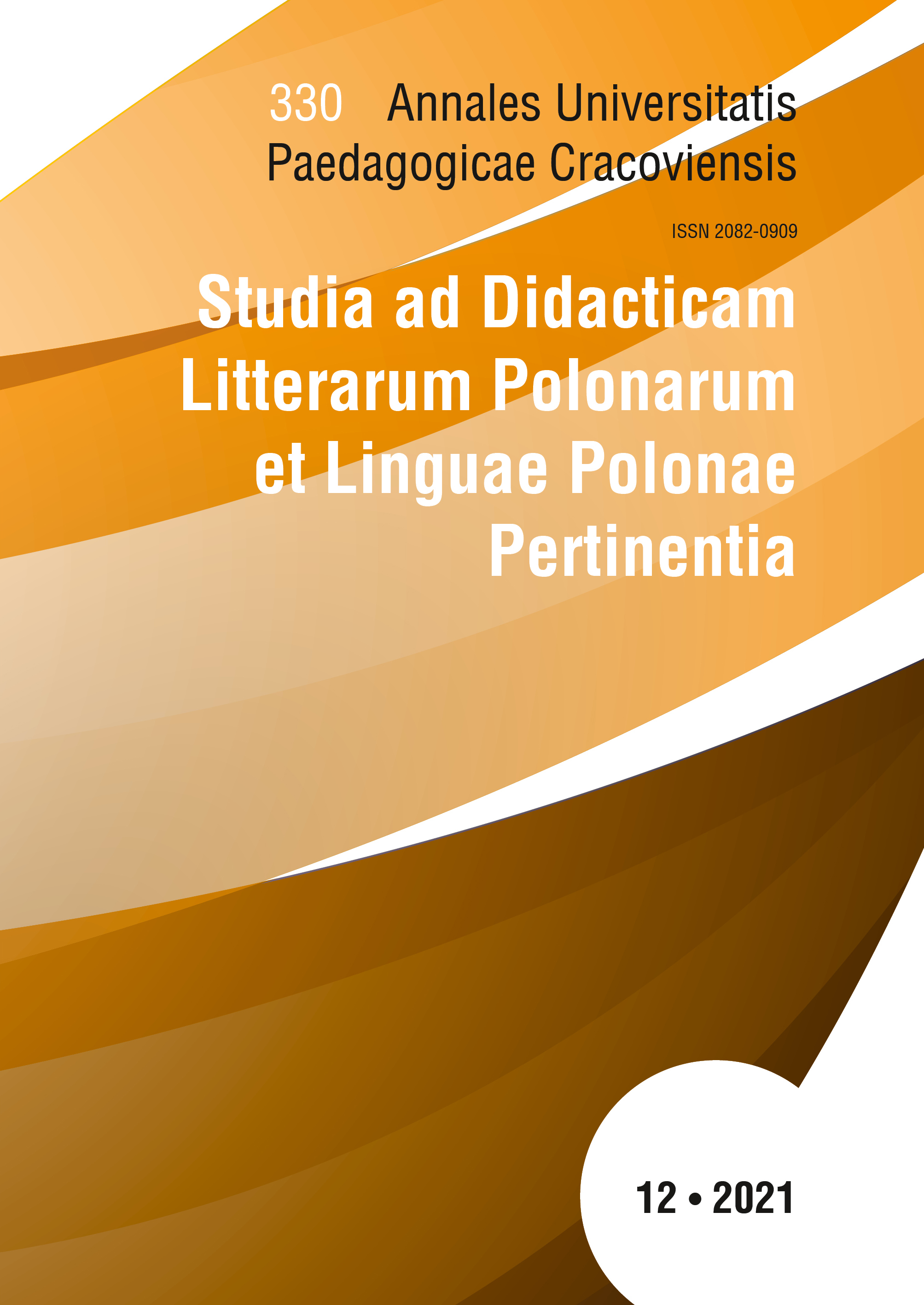Abstrakt
fourthgrade (fifth in technical secondary school) of secondary school. The novel by Eco fitswell with the specific implementation guidelines for literary and cultural education AT both levels of reading. It gives the opportunity to use many valuable cultural texts (including philosophical and literary ones) within the interpretative function. The novel is multi-thematic. It presents both the cultural past of the Middle Ages and the nature of man (his strength and weaknesses in discovering the truth about the world). The work consists of two parts. In the first part, the author propos es selected fragments of the novel (oritswhole) for reading. They serve to deep en the knowledge about the culture of the Middle Ages, also in the context of going beyond the stereotypical image of this era as a darktime. That is why special attention is paid to the matter of the novel’s role of laughter in the Middle Ages. In the second part of the article, the analysis focuses, among others, on playing with the literary text and genre convention (The Name of the Rose as a postmodern novel). The series of les sons also puts forward the topic of becoming inspired by the works of J. Borges and literary tradition as a living component of contemporary culture.
Bibliografia
Arystoteles, Etyka nikomachejska, tłum. D. Gromska, Warszawa 1956.
##plugins.generic.googleScholarLinks.settings.viewInGS##
Bondanella P., Umberto Eco, tłum. M.P. Markowski, Kraków 1997.
##plugins.generic.googleScholarLinks.settings.viewInGS##
Borges J.L., Biblioteka Babel, [w:] J.L. Borges, Fikcje, tłum. A. Sobol-Jurczykowski, Warszawa 2019.
##plugins.generic.googleScholarLinks.settings.viewInGS##
Bortnowski S., Konteksty dzieła literackiego, Kraków 1991.
##plugins.generic.googleScholarLinks.settings.viewInGS##
Chmiel M. i inni, Ponad słowami. Podręcznik do języka polskiego, klasa I, część I, Warszawa 2019.
##plugins.generic.googleScholarLinks.settings.viewInGS##
Chrząstowska B., Lektura i poetyka. Zarys problematyki kształtowania pojęć literackich
##plugins.generic.googleScholarLinks.settings.viewInGS##
w szkole podstawowej, Warszawa 1987.
##plugins.generic.googleScholarLinks.settings.viewInGS##
Eco U., Dzieło otwarte, tłum. J. Gałuszka, Warszawa 2008.
##plugins.generic.googleScholarLinks.settings.viewInGS##
Eco U., Imię róży, tłum. A. Szymanowski, „Kolekcja Gazety Wyborczej”, Warszawa 2004.
##plugins.generic.googleScholarLinks.settings.viewInGS##
Eco U., O bibliotece, tłum. A. Szymanowski, Wrocław 1990.
##plugins.generic.googleScholarLinks.settings.viewInGS##
Grodecka A., Lektury stulecia. Słynni pisarze, wielkie dzieła, Warszawa 2000.
##plugins.generic.googleScholarLinks.settings.viewInGS##
Michałowska T., Średniowiecze, Warszawa 1999.
##plugins.generic.googleScholarLinks.settings.viewInGS##
Podstawa programowa, https://cke.gov.pl/images/ EGZAMIN_MATURALNY_OD_2015/Formula_2023/podstawa_programowa/jezyk-polski.pdf, s. 30 [dostęp: 09.01.2021].
##plugins.generic.googleScholarLinks.settings.viewInGS##
Strawa-Kęsek E., Metoda projektu w edukacji polonistycznej, Kraków 2015.
##plugins.generic.googleScholarLinks.settings.viewInGS##
Wittgenstein L., Tractatuslogico-philosophicus, przeł. B. Wolniewicz, Warszawa 2004.
##plugins.generic.googleScholarLinks.settings.viewInGS##
Netografia
##plugins.generic.googleScholarLinks.settings.viewInGS##
https://krakow.karmelici.pl/sanktuarium/klasztor-opis-wnetrza/4/ [dostęp:
##plugins.generic.googleScholarLinks.settings.viewInGS##
11.2020]. http://libraryofbabel.info [dostęp: 21.11.2020].
##plugins.generic.googleScholarLinks.settings.viewInGS##
Mity o wiekach ciemnych: https://www.tygodnikpowszechny.pl/mity-o-wiekach-ciemnych-34455 [dostęp: 10.11.2020].
##plugins.generic.googleScholarLinks.settings.viewInGS##

Utwór dostępny jest na licencji Creative Commons Uznanie autorstwa – Użycie niekomercyjne – Na tych samych warunkach 4.0 Międzynarodowe.
Prawa autorskie (c) 2021 Annales Universitatis Paedagogicae Cracoviensis. Studia ad Didacticam Litterarum Polonarum et Linguae Polonae Pertinentia

